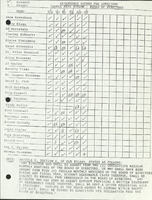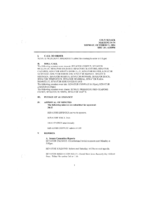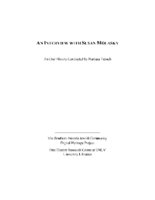Search the Special Collections and Archives Portal
Search Results

Minutes from Temple Beth Sholom Board of Directors meetings, June 1988 - May 1989
Date
Archival Collection
Description
Meeting minutes include reports from committees of the board, correspondence, and balance sheets.
Text

Meeting minutes for Consolidated Student Senate, University of Nevada, Las Vegas, October 11, 2004
Date
Archival Collection
Description
Text

Transcript of interview with Raymonde Fiol by Barbara Tabach, August 12, 2015
Date
Archival Collection
Description
In this interview, Fiol discusses her experience as a a hidden child in the Holocaust and her family's history. She also talks about her involvement with the Las Vegas Holocaust survivors group.
Raymonde "Ray" Fiol is president of the Holocaust Survivors Group of Southern Nevada. A Jewish Holocaust survivor whose parents were killed in Auschwitz, Fiol was hidden by a Christian family of Resistance fighters during her childhood in Nazi-occupied Paris, France. She married American serviceman Phil Fiol and left Paris in 1957. The couple lived in New York City where she worked in inventory control. She retired to Las Vegas, Nevada around 2003 and became active in the local Holocaust Survivors Group. In 2007, she became president of the organization, which provides essential services to Holocaust survivors and helps them share their stories. Fiol is also a member of the Nevada Governor?s Advisory Council on Education Relating to the Holocaust and the coordinating council of Shoah International. Her dedication to preserving the memory of the Holocaust and caring for survivors earned her the Nevada Senior Citizen of the Year award from the Nevada Delegation of the National Silver Haired Congress and the Aging Services Directors Organization in 2014, and in 2013 she was named Mensch Volunteer of the Year by the Jewish Federation of Las Vegas. In this interview, Ray reflects upon her traumatic childhood experiences, and shares how she learned details of her family?s history from a woman in France who had researched the destiny of the local Jewish community. She also discusses her involvement with the survivors group, and the positive impacts of its outreach activities, as well as goals to ensure future generations learn about, and from, the Holocaust.
Text

Transcript of interview with Irwin Molasky by David G. Schwartz, April 23, 2014
Date
Archival Collection
Description
Interview with Irwin Molasky by David G. Schwartz, April 23, 2014. In this interview, Irwin Molasky discusses arriving in Las Vegas in the 1950s, and building the Pyramids motel on the Strip. He talks about the entertainers in various hotels on the Strip, the concept of the "star policy," and bringing Parisian shows to Las Vegas. He goes on to discuss his real estate developments, including Paradise Palms, Boulevard Mall, and Sunrise Hospital, and donating the land for the development of UNLV.
Irwin Molasky came to Las Vegas in 1951, during a time when "everyone knew everyone else," and there was a small, but strong Jewish community. An Army veteran, Irwin and his wife moved to Las Vegas after living in California for a short time. Irwin soon built The Pyramids, a Strip motel next to the Flamingo Hotel and Casino. The Pyramids opened the same day as its northern next-door neighbor, The Sands Hotel and Casino, on December 15, 1952. Irwin used his newly acquired contractor's license to become on the city's most important real estate developers. Over the next 60 years, he built everything from residential housing, including Paradise Palms to commercial properties. Projects included Sunrise Hospital and the surrounding medical buildings; Sunrise City Shopping Center and other power centers; Bank of America Plaza and much other downtown development; and golf courses. When the recession hit, Irwin began bidding on government projects across the country, successfully shielding his business and employees from the economic downturn. Irwin's real estate ventures not only had a tremendous impact on Las Vegas' economic development, but a substantial effect in social programming. Irwin donated 40 acres of prime real estate to the University of Nevada - Las Vegas (UNLV) so that university could expand. Additionally, he was the Founding Chairman of the UNLV Foundation and received an honorary doctorate in humanities.
Text

Transcript of interview with Adele Baratz by Claytee D. White, March 19, 2007
Date
Archival Collection
Description
Interview with Adele Baratz by Claytee White on March 19, 2007. In this interview, Baratz talks about her parents who came to the United States as teenagers from Russia and eventually settled in Las Vegas after a short time in California. She discusses the Jewish community in Las Vegas when she was growing up, and her father's job selling bootlegging supplies, then as a real estate broker, then as a bar owner. Baratz attended the Fifth Street Grammar School, which was built after a fire destroyed the original school, and Las Vegas High School. As a teenager, she worked at Nellis as a messenger and in the rations department, then went to nursing school in Baltimore at Sinai Hospital. She talks about her father's bar, "Al's Bar," that was popular with Union Pacific Railroad workers, and how the bar was forced out for the building of the Golden Nugget. Baratz recounts where her family lived, the growth of the Jewish community, and building the first synagogue on Carson Street.
Text

Transcript of interview with Michael J. Montandon by Stefani Evans and Claytee D. White, September 22 & October 4, 2016
Date
Archival Collection
Description
Mike Montandon, former Arizonan and former three-term mayor of the City of North Las Vegas (1997-2009), is a natural storyteller. As he recalls municipal governance during a period of record-breaking growth, he talks of forming relationships with developers, legislators, and other municipalities; he speaks to land use, open space, parks, trails, conservation and the Bureau of Land Management (BLM) and Southern Nevada Public Lands Management Act (SNPLMA). He shares histories and stories of the Becker family's role in developing Clark County, of the Combs family's North Las Vegas pig farm; of the drama that routinely characterized BLM land auctions, and of why North Las Vegas spent millions of dollars to build its own sewage treatment plant. The guy who never ran for office in high school or college moved to North Las Vegas in 1992 and four years later was elected as mayor of one of the nation's fastest-growing cities. He ran because he realized the City was populated with people just l
Text

Frieda Steinberg interview, September 10, 2014, November 10, 2014, August 15, 2017: transcript
Date
Archival Collection
Description
Interviewed by Barbara Tabach.
Text

David Ober interview, October 11, 2017: transcript
Date
Archival Collection
Description
Tucson, Arizona, native David Ober moved to Las Vegas twice. He arrived reluctantly the first time in 1978 with his parents as a high-school student, when his father, Hal Ober, came to Las Vegas to begin building and marketing the U.S. Home (now Lennar) brand. While the elder Ober soon left U.S. Home to open his own home-building business, R.A. Homes, his youngest child left Las Vegas shortly after his high school graduation to return to his native Tucson, follow in the footsteps of his siblings, and attend the University of Arizona. After graduating from the University of Arizona David Ober opened his own mortgage company and began building a life in Phoenix. In the late 1980s he agreed to take a large pay cut, return to Las Vegas, and learn his father's business from the ground up. At the time, Hal Ober was developing his award-winning, master-planned community, Desert Shores. David Ober, the youngest of the five children of Hal and D'Vorre (Dee) Ober, agreed to participate in the
Text

Transcript of interview with Robert & Patricia Campbell by Stefani Evans, November 28, 2017 & March 1, 2018
Date
Archival Collection
Description
In 1976, when Bob Campbell accepted the city manager position in Henderson, Nevada, he and his family had just endured nearly a month of sub-zero temperatures in their native Missouri. Southern Nevada's mild winter coupled with the promise of developing the 8,600 acres that would become Green Valley convinced Bob and his wife, Pat, to make the move. Bob came to Henderson with a degree in public administration and city manager experience in two Missouri towns, but Green Valley offered something akin to "an artist having a blank canvas on which to plan and create." In this interview, Bob talks about the ways his career in public administration blossomed in Southern Nevada. After about five years with the City of Henderson, Campbell joined Mark Fine and American Nevada Corporation to develop Green Valley; five years after that, he moved to Southwest Gas Corporation to work with Bill Laub and later, Kenny Guinn. From about 1989 to 1997, he helped develop Lake Las Vegas. In 1994, Bob and Pat together formed The Campbell Company, a private consulting firm whose clients included Transcontinental Properties' Lake Las Vegas project as well as Henry Chen's Ascaya. v Much of the interview focuses on the Lake Las Vegas project: its original visionary, false starts, and its tumultuous development as an arm of the Bass brothers of Fort Worth, Texas; their developer, Ronald Boeddeker of Transcontinental Properties in Santa Barbara, California, and Boeddeker's appointee, Alton Jones. Along the way Campbell shares the strategies employed by the Wednesday morning group of Henderson boosters who met at Saint Peter's Catholic Church and who succeeded in gaining the necessary local, state, and federal approvals to move the project forward. He reveals the intimidation, physical threats, and sexual harassment suffered by those who questioned the way Jones did business. Overall, though, he explains why he continues to respect the Bass brothers and is still proud of Lake Las Vegas, "proud that we got it on, and proud that it's turned out to be what it is."
Text

